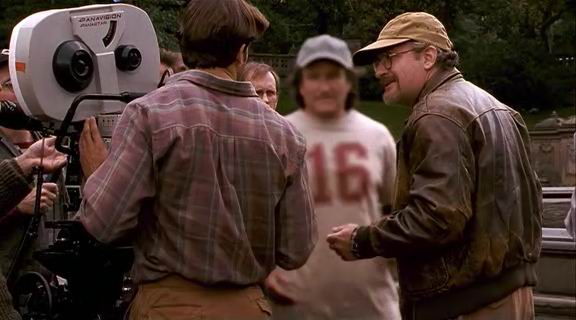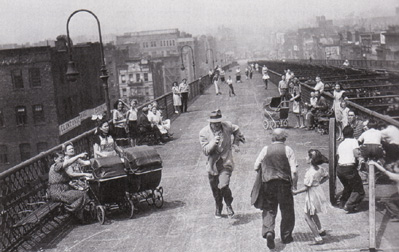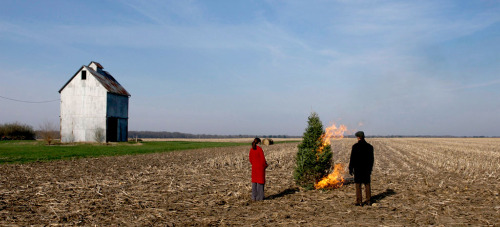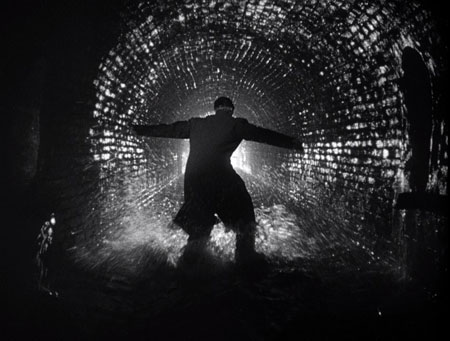My local library has an excellent DVD collection. I made a run a few days ago and decided to do mini reviews for all the DVDs I checked out.
1. Redbelt
2008, Directed by David Mamet

This is the first Mamet film I’ve seen, and according to Roger Ebert and the Reverse Shot blog, I should have started with one of his earlier films. Being my first, I missed its shortcomings and was mesmerized by the energy of its performances and dialog and the seeming random plotting of its first half. Roughly, Redbelt is set in the world of mixed martial arts and pay-per view fighting, and deals with a maddeningly confusing conspiracy directed against a down-on-his luck martial arts instructor. This film is about the way society cheapens ideas of morality and honor by using them as a facade for power-grabbing and greed. The hero, played by Chiwetel Ejiofor, who delivers a brilliant performance, is an idealist who must confront these corruptions. I found it refreshing that rather than losing his beliefs, he holds fast to them. Mamet modernly shows the corruption in all of us, but classically gives us a Mr. Smith-type hero who pervades against it. The ending leaves almost every plot point hanging, but is nonetheless satisfying in it’s directness and intensity.
2. Deconstructing Harry
1997, Directed by Woody Allen

I’m trying to watch through Woody Allen’s entire filmography. I’m now fifteen films in and I’m still fascinated by his simplistically prodigious approach to screenwriting and filmmaking and the deep intellectual questions he raises in his projects, no matter how silly or serious they are. Allen’s films all deal with marital infidelity, but so far this one takes the cake. Allen plays Harry, a sex crazed loser who is nonetheless a fantastic, well loved writer, and the film highlights his three failed marriages and countless affairs. All of Harry’s writing deals with these personal failures, and the film is made up of a series of disjointed narratives from his books, which Harry, constantly popping pills, hallucinates, highlighting dozens of big name actors performing scenes from his life. The disjointedness of these “deconstructions” is aided by brilliant and sometimes hilarious jump-cut editing. Harry’s psychiatrist says early in the film that Harry “expect(s) the world to adjust to the distortion you’ve become.” Having seen so many of Allen’s films, I can’t help but wonder if this is an apt description of the filmmaker’s life. Harry muses that “all I have in life is my imagination,” and by the end of the film he has come to the realization that “our life consists of how we choose to distort it.” Allen’s character chooses to live and distort his life through his art, just as I fear Allen does.
3. The Third Man
1949, Directed by Carol Reed
Yes, I know, it’s ridiculous that I hadn’t seen this yet. I think they even showed it at my film school, but that must have been one of the few showings I skipped. I can’t say much that’s not already been said. It’s beautiful and startling. It’s at times very funny, very sad and very eerie. Orson Welles delivers maybe the most powerfully creepy performance I’ve encountered in cinema, and every time he enters the frame, the energy just crackles. This film is about love and forgiveness versus justice, it’s an intelligent rendering of a post-war Europe, and just a ripping good yarn. Do yourself a favor and watch it!
4. The Naked City
1948, Directed by Jules Dassin

A crime noir and a police procedural, this film stands out from other noir films of its day because it was shot almost entirely on location in New York city. Heavily influenced by Italian Neorealism, it captures what life in the Big Apple was like in the late 40s. The plot follows a homicide case from the murder to the final police bullet fired. We still get a wallop of hollywood melodrama, but overall I was impressed with the restraint the director took in keeping as close as marketably possible to a realistic police case. The black and white photography is gorgeous, especially in the final contrasty scene atop a looming bridge. Also, I couldn’t get over how uncannily actor Don Taylor, who plays the rookie detective, resembles Luke Wilson, from build and features down to facial expressions and mannerisms. Weird.
5. The Merry Gentleman
2008, Directed by Michael Keaton

The trailer to this film fascinated me. One, it’s shot in my hometown of Chicago, which seems to be underrepresented in cinema lately, and two, it stars Michael Keaton, who hasn’t done much lately. He also directed it. I was really enjoying it. The pacing was slow and moody, the photography was gorgeous, and the characters were complex and believable, and then the filmmakers played the lowest, cheapest trick in the book. They brought back an abusive character into the lead female’s life, and made him even more threatening by having him confess to trusting in Jesus Christ as his personal savior. His eyes glowed evilly, he rose threateningly and the music got really creepy. That the screenwriters distrust and hate Christianity so much as to ruin a perfectly realistic movie with an entirely unrealistic and overdone character development, that they are willing to use their art as an offensive vehicle to make people like me look insane, well, I was so offended that I switched it off.

